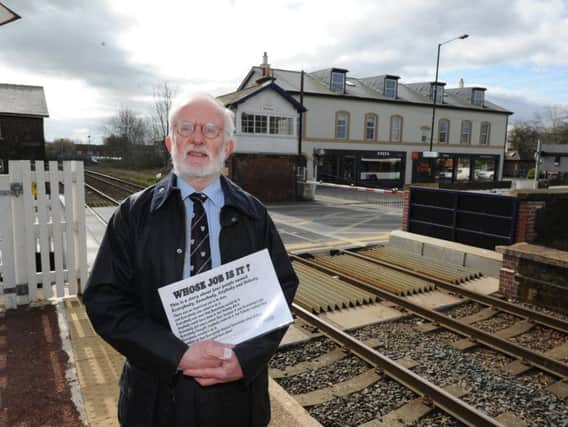Harrogate's worst crossing: How it can be solved


An unlikely David and Goliath struggle has broken out over what is claimed to be “excessive delays” at one of Harrogate’s at Starbeck railway level crossing.
On the one side is a single resident convinced more could be done to reduce the amount of time the railway barriers are down at a crucial point on Knaresborough Road, one of Harrogate’s most essential and busiest routes.
Advertisement
Hide AdAdvertisement
Hide AdOn the other is Network Rail, the giant semi-public body which own and operates 20,000 miles of track and the railway infrastructure in England, Wales and Scotland on behalf of the nation.
In a way, Bilton resident Trevor Dale is not fighting a lone battle.
His frustrations are shared on a daily basis by hundreds of drivers stuck at the crossing for three minutes or more on their slow way along Knaresborough Road.
Network Rail says it has investigated whether improvements to the crossing or the signalling would reduce the amount of time the barriers remain in the down position and it is convinced the answer is ‘no’.
Advertisement
Hide AdAdvertisement
Hide AdBut Mr Dales’ concerns are also shared by former chief executive of Harrogate and District Chamber of Commerce, Brian Dunsby who has spent the best part of two decades campaigning for a better rail service for Harrogate.
Now a spokesperson for Harrogate Line Supporters Group, he told the Harrogate Advertiser that the Harrogate-York line had been ear-marked to be upgraded with additional modern signals in order to operate two trains an hour between York and Harrogate but the project had been delayed by Network Rail.
He says he is worried that the possibility of increasing the number of services on the York-Harrogate-Leeds line as part of Network Rail’s recently announced £42 billion railway improvement plans will lead to even greater traffic delays at Starbeck.
Harrogate and Knaresborough MP Andrew Jones, himself a junior minister for transport, has helped put Mr Dale in touch with Network Rail.
Advertisement
Hide AdAdvertisement
Hide AdDescribing it as an “important issue”, Mr Jones said it was up to Network Rail to try to minimise disruption.
If Mr Dale’s case is being taken seriously it is, perhaps, because his arguments are the result of years of study, not just into the operation of the level crossing at Starbeck but at what he says are other comparable railway crossings across the country.
His in-depth personal investigations include looking at crossings at Swineshead Bridge near Boston in Lincolnshire, Nantwich in Cheshire and Barmouth in north west Wales. With sheets and sheets of figures looking at TPS (the train protection system to ensure safe operation in the event of human failure) and calculating the distance of AWS (Automatic Warning System) from the signals to the potential train/traffic hazard at a crossing, it is the sort of information usually found only in Rail Technology Magazine, the UK’s number one rail industry magazine.
The determined resident’s research also includes copious notes on the location and the speed limits and timings of trains approaching Starbeck level crossing, in particular.
Advertisement
Hide AdAdvertisement
Hide AdMr Dale is not arguing that the safety of rail passengers or motorists should not be of the highest priority.
But he is arguing that, even by the rail industry’s own standards, the system as it is now at Starbeck is excessively cautious and could be improved to the benefit of road traffic.
He said: “Network Rail has been so unresponsive, it’s run out of time. I fet it was time to go public.
“A maximum two-minute down time for crossing trains ought to be an easily achievable target.
“There needs to be an improvement to infrastructure.
“Network Rail should be striving for more.”
Reducing delays at Starbeck rail level crossing
Mr Dale’s main claims are:
Advertisement
Hide AdAdvertisement
Hide AdDown times for level crossing barriers are substantially longer than other rail stations elsewhere.
The safety systems at Starbeck are more suited to cope with heavy goods trains or fast inter-city trains than the modest commuter carriages the Harrogate line is accustomed to.
The line speed limit is inappropriate for the current signalling arrangement on the approach to Starbeck station.The signalling spacing between the outer home and station signal is more appropriate for a speed of 20mph, not the current 60mph.
If the signals systems round Starbeck were relocated closer to the crossing, trains would be able to get closer before the barrier at the level crossing had to come down, shortening the barrier’s down time.
Advertisement
Hide AdAdvertisement
Hide AdIf simple adjustments were made to the train timetable so that when two trains coming from opposite directions from Leeds and York have to cross at Starbeck their separate arrivals coincide better, which happens 27 times a day, the down time of the barrier would, again, be shorter.
The above are all claims which are dismissed by Network Rail itself.
It says it is already doing a lot of work to minimise barrier downtime at Starbeck level crossing and will continue to do so.
But if the David in this battle is right and the Goliath is wrong, the calculation is that the barriers would be down by between one and two minutes each time rather than three to four minuies.
And that would add up to a lot of hours saved by a lot of drivers in Harrogate.